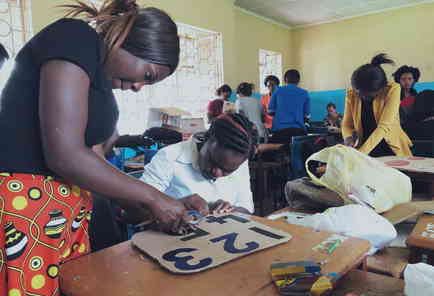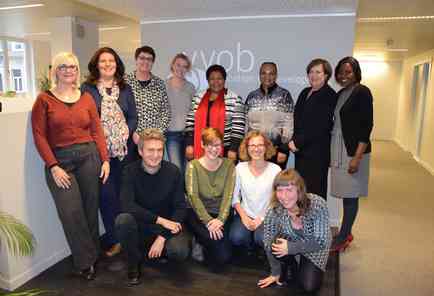Last November, Professor Kwame Akyeampong travelled across the Canal to give eNSPIRED’s first guest lecture. The topic of eNSPIRED for the 2017/18 schoolyear is ‘vulnerable children and youth at school’. The professor’s expertise on the role of teacher education for vulnerable learners fits the cause perfectly. Respondents of the survey afterwards indeed concluded: “The ten recommendations of Professor Akyeampong can guide our strategic thinking on ‘teachers and inclusion’ in Flanders.”
Pygmalion
In June, the advisory committee of eNSPIRED chose ‘vulnerable children and youth’ as the year’s main theme. International studies repeatedly show that the number of poor performing learners is growing in Belgium. It is even more worrying to note that in Belgium, more than in other countries, socioeconomic and not migration background is a determining factor in school performance. Research studying the causes point to the Pygmalion-effect: teachers in schools with a high concentration of working class children have lower expectations of the ‘teachability’ of those pupils. This leads to a self-fulfilling prophecy.
Joining forces
Teacher trainers are very motivated to do something about this. The coming year, eNSPIRED offers them a platform to discuss these challenges among themselves and with experts from VVOB’s partner countries.
To get things started, eNSPIRED invited Kwame Akyeampong, a professor of International Education and Development from the Centre for International Education (Sussex University, United Kingdom).
On November 14, he gave a guest lecture at Odisee University College for (student) teachers, teacher trainers and other educational practitioners: ‘Learning Opportunities for Vulnerable Children and Youth: the Teacher Matters!’.
Gap
The professor kicked off with a statement: European classrooms are diversifying at a fast pace. The gap in learning outcomes between first generation migrants and native learners is huge, but the economic, social and cultural status of the pupils drives this difference too.
Teachers feel unprepared to teach in multi-ethnic classrooms. Moreover, it’s often newly qualified teachers who teach in schools with a high concentration of pupils with a vulnerable socioeconomic background.
All aboard
In Professor Akyeampong’s view, teacher education has a major responsibility to close this gap: “We shouldn’t only talk about vulnerability in specialised courses for student teachers, nor focus exclusively on their pedagogical and didactical skills. We need to approach the teacher training system holistically and integrate a vision of how we want our future teachers to teach in order to close the learning gap.”
In this holistic approach, it is crucial to address teachers’ expectations of their learners and figure out how to deal with the above-mentioned Pygmalion effect. “I strongly advocate for all teachers to develop the skills to maximise the learning potential and learning outcomes of all learners. These skills shouldn’t only be developed in a handful of ‘specialised’ teachers.”
10 times better
The professor rounded up his guest lecture with concrete recommendations on how to make teacher training more relevant for today’s diverse classrooms. Teacher training should at least take up the following ten responsibilities:
-
Develop teachers’ capacity to diagnose learning problems of disadvantaged students.
-
Provide opportunities for all teachers to learn to teach in disadvantaged schools to improve their understanding of disadvantaged schools and students.
-
Develop professional learning communities that can share knowledge and experience of teaching that improves learning for disadvantaged students.
-
Promote an inclusive pedagogy.
-
Create more choices for how students learn and how they are evaluated.
-
Promote dynamic learning groups.
-
Present teaching as a problem-solving activity so that difficulties in learning are seen as a challenge, rather than as deficits in learners.
-
Capitalise on diversity to enrich the learning experience by using cases and examples that value difference.
-
Create learning opportunities that stress collectivity as well as individuality to accommodate and celebrate difference
-
Use action research to build a knowledge base of what works and what doesn’t in improving learning opportunities for disadvantaged students, and why.
In the afternoon
In the afternoon, the participants had the opportunity to continue the conversation with the professor. But they could also opt for another workshop, such as the ‘Privilege Walk’, a self-reflection game on equity in education.
Participants could also join Mohamed Chatouani from Democratic Dialogue (Erasmus University College) for a session on dealing with sensitive and controversial topics such as religion, especially Islam, and philosophy.
Mirna Nel, Inclusive Education professor from the North-West University in South Africa, spoke about the importance not to limit the concept of inclusion to learners with a disability, but to also include other learning barriers such as language and socioeconomic background. (presentations, see below)
What did we learn?
eNSPIRED organises these activities to first and foremost inspire its participants to look at challenges of equity from a different angle. Their learning experiences are our priority. The answers of participants to the question ‘What did you learn from the guest lecture?’ encourages us to keep going:
“The ten recommendations of Prof. Akyeampong can guide our strategic thinking on ‘teachers and inclusion’ in Belgium.”
“Many people think that these problems are typical for Brussels, but clearly we all face similar problems.”
“The guest lecturer mentioned the importance of pedagogical skills. In the ongoing reforms of the university-level teacher training, this is an issue. More importance is given to subject knowledge. This worries me.”
“Next to subject knowledge, pedagogical knowledge and skills, the acceptance of diversity is necessary to discover what the added value of this diversity can be to change learning strategies.”
“The stranger becomes a friend through dialogue and a shared search for solutions to challenges in education and the world. By doing this, we’re working towards inclusive, sustainable and quality education.”
Good news! All eNSPIRED guest lectures are filmed so you can integrate them in your teacher training courses.
eNSPIRED learning week 2018
Champion quality education for vulnerable children and youth!
Mark 18 and 19 April 2018 in your agenda! eNSPIRED invites educational practitioners from Surinam and Zambia to share experiences with Flanders on a similar challenge: ensuring quality education for vulnerable children and youth. Join us for a dialogue with educational professionals from Surinam and Zambia on poverty in early childhood, primary and secondary education.

